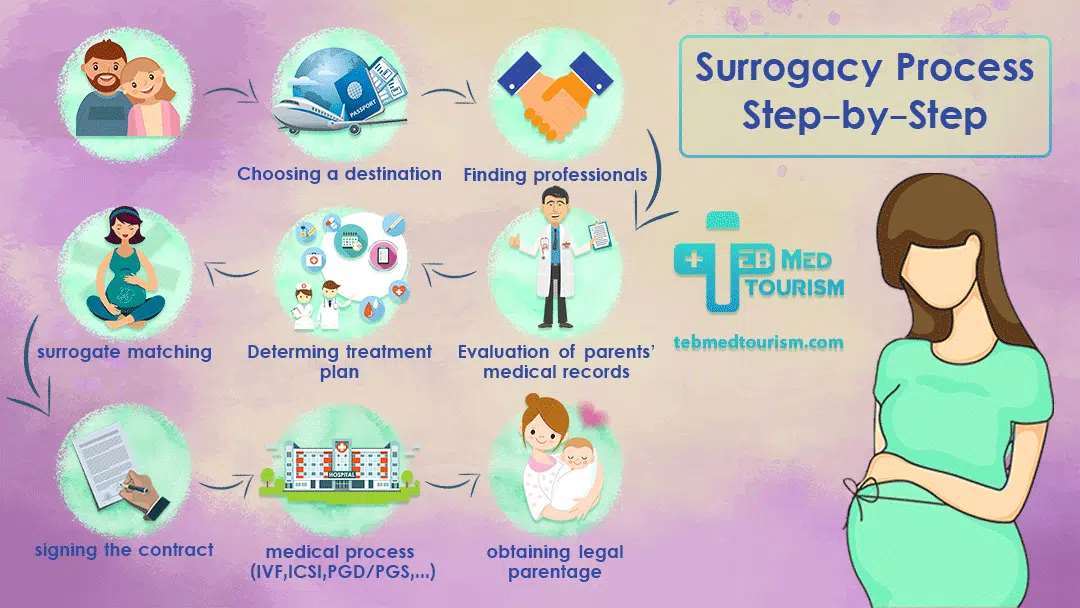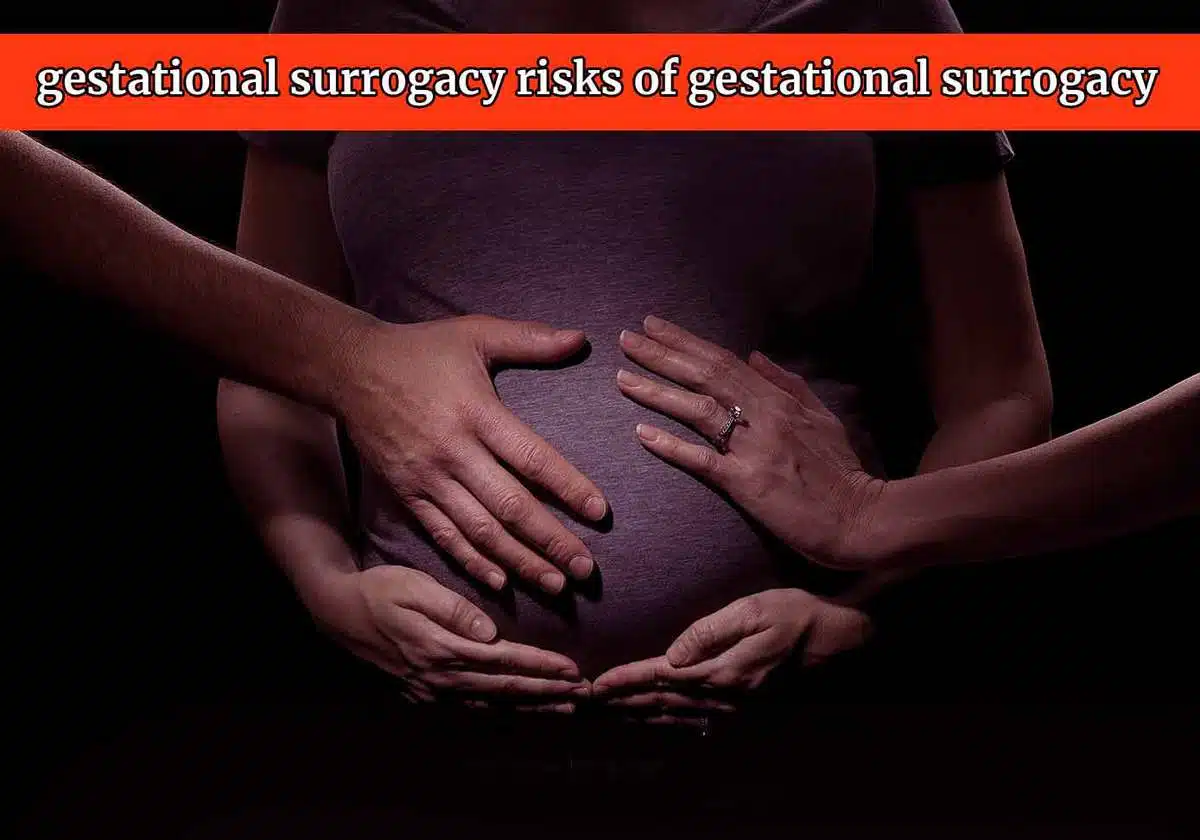This approach will have many advantages and disadvantages for couples who are tired of conventional infertility treatment methods, fully discussed in the article “Advantages and disadvantages of surrogacy for infertility treatment”.
But another influential person who will play a central role in this process is the “surrogate mother” or the woman who agrees to raise someone else’s fetus in her uterus to fulfill the wish of having a child of their own for an infertile couple.
- But is this process going to endanger the health of surrogate?
- What are the risks for a surrogate mother in developing this generous action?
Gestational Surrogacy
“Gestational surrogacy”, that is also called “host surrogacy” or “full surrogacy” is the most common type of surrogacy in which the surrogate is not biologically related to the child that she is carrying. This technology has helped thousands of couples and individuals have their own kids and grow their families. In this method, the embryo is created in a laboratory via in vitro fertilization (IVF), using the egg and sperm of the intended parents or donors. Then the embryo is transferred to the surrogate’s uterus for growth. In this method, the baby shares DNA with the providers of the egg and sperm; therefore, the surrogate is merely the carrier of the baby. In most cases, at least one parent shares DNA with the baby. People with infertility issues and anyone who is unable to safely carry a pregnancy to term can use gestational surrogacy.
Does a Gestational Surrogate share DNA with the Baby?
In gestational surrogacy, the embryo is formed with the fertilization of the egg and sperm of the intended parents or donors in a laboratory. Then the embryo is transferred to the surrogate’s uterus using a catheter. In gestational surrogacy, the surrogate serves as a carrier of the fetus and does not share DNA with the baby. The baby only shares biological links with those who shared eggs and sperm for making the embryo. However, in traditional surrogacy, the surrogate would share biological links with the baby since she is also the egg donor.
Gestational Surrogacy Process

Gestational surrogacy is the most common type of surrogacy today. In this process, the embryo is made using the eggs and sperm of the intended parents or gamete donors through the in vitro fertilization cycle in a laboratory environment.
In the gestational surrogacy process, the gestational carrier hosts the embryo in her uterus to be nourished and developed and finishes the pregnancy term.
Surrogates undergo the surrogacy process either for humanitarian reasons, which means helping another family have a baby and grow in size or for commercial goals so that they receive compensation for what they are doing.
After the pregnancy comes to full term, the surrogate delivers the baby and hands them over to the intended parents. In the gestational surrogacy process, the baby biologically often belongs to the intended parents or at least one of them since they have provided the eggs and sperm for the IVF cycle.

What are the Negative Effects of Gestational Surrogacy?

Since surrogacy is only another form of getting pregnant, it could have the same medical risks as pregnancy like weight gain, nausea, back pain, swelling, hypertension, and gestational diabetes. There are some side effects related to the IVF process like bruising at the injection site, allergic reactions to medications, etc. While transferring the embryo, there are few risks of mild cramping, light bleeding, or infections. In vitro fertilization can also increase the chance of carrying multiples which has certain risks.
Surrogacy can be an overwhelming experience both for surrogates and intended parents. Surrogates could experience depression and the feeling of loss at the end of the pregnancy when they should deliver the baby to the intended parents. They may experience a difficult time if their families or friends are not supportive and they may have tensions with their spouses.
Legal works are an undividable part of surrogacy which requires a lot of attention before you start the procedure. You need to choose an experienced surrogacy agency that is well-informed about the laws of the origin country and the destination country regarding gestational surrogacy. Both parties need to have their own attorneys to clearly understand the rules of the process.
TebMedTourism has extensive knowledge about the needed legal contracts and experienced attorneys to ensure everything happens legally and legal issues are prevented.
Risks of Gestational Surrogacy

Gestational surrogacy has some common risks which do not necessarily happen to all people but you may face some of them. Risks of gestational surrogacy include health risks, emotional risks, and legal risks.
Gestational surrogacy involves transferring the embryo via IVF in a fertility clinic. Just like any other medical procedure, the IVF cycle can have some risks from slight needle bruising to temporary allergic reactions to medications and mood swings. In addition, similar side effects of pregnancy are common such as morning sickness, swelling and soreness, and general discomfort. The common health risks of pregnancy may include hypertension, gestational diabetes, reproductive organ damage, and miscarriage. The potential risks related to IVF are slight bleeding, cramping, and infection.
Surrogacy is more than just a medical process since it has emotional challenges such as feelings of loss at the end of the process, tension with your spouse and/or children, difficulty in forming a relationship with the intended parents, and depression. Surrogacy has also some legal risks so if you have a bad surrogacy contract, you may put yourself in a difficult situation. By working with a surrogacy agency with extensive legal knowledge you will be more confident about the validity of your contract for both the surrogate and the intended parents.

A Momentous Decision:
One of the most significant decisions that a woman can make in her life is the one to become a surrogate mother by gestational surrogacy treatment. Although with this choice, this woman can transform the life of an infertile couple in the best way, her own life is also going to be greatly affected.
A surrogate mother is supposed to carry a baby that will eventually be separated from her and handed over to another couple. Surrogacy, in addition to the usual pregnancy complications, will also bring a lot of other complexities and psychological burdens to the surrogate mother. Therefore, she should be aware in advance of all the uncertainties that may occur along the way.
In general, the difficulties ahead can be divided into three categories:
– Medical risks of surrogacy
– Emotional risks of surrogacy
– Legal risks of surrogacy
problems surrogate mothers may face gestational surrogacy
Pregnancy Complications:
Gestational Surrogacy procedure will primarily involve pregnancy as its term. Therefore, the surrogate mother can experience all the possible and general complications of pregnancy including morning sickness, weight gain, swelling, back pain, heartburn, and other bothersome. In some cases, more severe complications may occur for example, gestational diabetes, hypertension, or even damage to the reproductive organs.
On the other hand, like any other pregnancy, there is a possibility of miscarriage or premature birth, which requires regular monitoring, examination, and prescription of appropriate medications by the treating physician for prevention. However, the risk of miscarriage rises with increasing maternal age and, for example, rarely occurs in the 20s.
In some cases, Ectopic Pregnancy has been observed. If you notice symptoms of this type of pregnancy, such as vaginal bleeding or severe back pain, you should see your doctor as soon as possible receiving appropriate treatment.
Multiple pregnancy (pregnancy with more than one baby)
In this method, since more than one embryo is transferred to the mother’s body during the IVF stage to increase the pregnancy rate, the possibility of multiple pregnancies increases. This will require specific instructions from the treating doctor so as not to damage the mother’s daily life and the pregnancy outcome.
In such a case, the possibility of giving birth to low weight or premature babies, placental abruption, and the need for a cesarean section will increase.
“Multifetal pregnancy reduction” or “selective reduction” is a method that can be used to reduce the number of fetuses in the uterus in the early stages (if multiple pregnancies are observed).
Taking specific medications
There are also potential risks associated with IVF (in vitro fertilization). Because the surrogate mother must take or inject medications due to the IVF process to increase the chance of pregnancy, and regulate the menstrual cycle, needle bruising, allergic reactions, and increased premenstrual syndromes are possible.
In rare cases, there may be some infections.
Embryo transfer
Unpleasant experiences may also occur during the transfer of the fetus to the surrogate mother. For example, cramping, bleeding, and in rare cases, infections that can be treated with antibiotics.
Despite these potential complications, the surrogacy agency that you consider must perform thorough examinations and tests before taking any action.
These tests will allow your doctor to be aware of your underlying medical conditions and preventing any abnormalities in your pregnancy.
TebMedTourism Co.; a surrogacy facilitator company with a license from the Health Ministry of Iran, can accompany you on this road.
Emotional problems surrogate mothers may face
In addition to the medical problems mentioned, the decision to become a surrogate mother will have possible psychological consequences for the mother.
While an experienced and professional infertility medical team and the clinic can manage the potential medical problems and risks of surrogacy, the emotional side effects directly target the surrogate mother and should not be underestimated.
Depression
In this approach, although the surrogate mother will be happy to help the infertile couple experience the taste of parenthood, she will be more likely to feel depressed during and after the procedure. This feeling of loss and depression will increase, especially after delivery and separation from the baby who has been in the mother’s body for nine months.
In this case, it is very important that the surrogate mother has a supporting network of people on her own or, if necessary, consult a psychologist to share and reduce her unpleasant feelings.
Impact on personal and family relationships
Being a surrogate mother can affect a person’s family life, their relationships with their spouse and children, and create tensions.
Since in the early stages of the process, a person’s sexual relationship with her spouse is affected, and on the other hand, in the last months of pregnancy, the spouse’s duties in caring for household errands will increase, the process must start with the approval of the spouse in the first place.
On the other hand, in this period, the surrogate mother should form a good relationship with the infertile couple, which, like any newly formed human relationship, can bring some challenges.
Legal problems surrogate mothers may face
Lack of adherence to the contract and financial commitments
Both parties must live up to their commitments. Cases have been reported in which, after the end of the process, the infertile couple refused to fulfill their financial obligations to the surrogate mother, and vice versa. Therefore, it is important to have an experienced legal team, along with the surrogacy agency you are looking for, which can manage legal matters.
TebMedTourism Company can stand by both sides in the legal process of this method, and prevents such problems as much as possible by concluding formal and notarized contracts.
It should be noted that many of these risks are items that would also exist in a normal pregnancy.
In addition to the dangers that may arise along the way, if you are matched with an expert medical team, you do not need to experience these in person. It is undeniable that each person will have different circumstances and, therefore, will take a different path.
Finally, helping an infertile couple achieve their dream of having a child is an experience that will bring you a lot of good feelings and value.
Also, if you need further consultation, the consultant medical doctors of TebMedTourism Co. are ready to answer your questions, free of charge, 24/7.
















